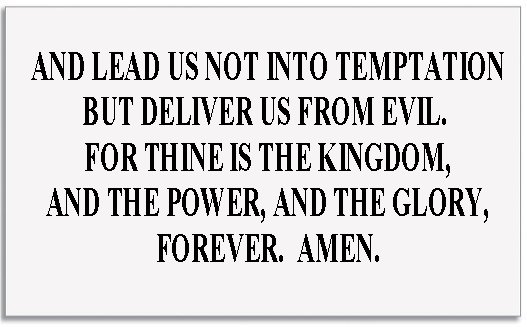| |
MATTHEW 6:13 “AND LEAD US NOT INTO TEMPTATION, BUT DELIVER US FROM EVIL. FOR THINE IS THE KINGDOM, AND THE POWER, AND THE GLORY FOR EVER. AMEN.” (KJV, NASB)
(Luke 11:4 “…And lead us not into temptation, but deliver us from evil.”)
“And do not lead us into temptation, but deliver us from the evil one. For Yours is the kingdom and the power and the glory forever. Amen.” (NKJV)
“And bring us not into temptation, but deliver us from the evil (one).” (ASV, RSV, TLB, NIV)
Anyone who has been in a Sunday School class with me for very long knows I love logic puzzles. It annoys most people, but I love them. I’m sure I annoy some with them as well. I’m sorry.
This passage of Scripture is a perfect example of such a puzzle. We all want to pray for God to deliver us from evil. But, what does Jesus mean when He encourages us to plead that He would NOT lead us into temptation?
Most explanations of this Scripture suggest that both halves of this prayer plead with the Lord to help us in all areas of temptation. That is true. We do want that. But, can God lead us into temptation? If the verse is to be taken literally, it would seem that Jesus was instructing us to plead for the Father not to do that….not to lead us into temptation.
Of course, every Bible student will quickly quote James 1:13-14, “Let no man say when he is tempted, I am tempted of God: for God cannot be tempted with evil, neither tempteth he any man. But every man is tempted, when he is drawn away of his own lust, and enticed.” So, logic says that God does not tempt any man, yet in this section of the Lord’s Prayer, Jesus tells us to pray, “Father, lead us not into temptation.”
As a quick aside, let me counsel you to consider this. If it appears to you that, in your understanding, the Bible seems to contradict itself, it is more likely your understanding that is at fault. Central to our Christian faith is belief in the inerrancy of the Bible. Despite some suggestions that there are errors in the translations of the Bible over many centuries and through many languages, the Word of God is forever true and God will not contradict Himself. If error seems evident to you, I would encourage you to study the Word even more and learn how your understanding comes up short, not the Word itself. This Scripture is a good example.
This passage is undoubtably a plea to God, on our part, for guidance and strength to avoid situations where one might be tempted to sin or to overcome the desire to act against God's will. It is also an acknowledgment of human weakness and a request for God to either keep temptations away or provide the spiritual resilience needed to resist them when they do arise, ensuring one's faith remains strong.
As one writer put it, “This prayer implies a need for God's intervention to give the strength and knowledge to resist temptations when they are encountered. In essence, it is a humble and ongoing petition for protection and guidance from the dangers of sin that permeate the world, rather than a direct theological statement that God causes temptation.”
On the other hand, we cannot deny the fact that the Lord does allow us to be tempted. This is not only what identifies us as human but also uniquely demonstrates our “God-like” quality He created us with that always gives us choice.
In the Garden of Eden, God did not tempt Eve (and later Adam) to eat of the very fruit He forbade them to eat. We cannot deny, however, that it was God who showed Adam and Eve the fruit from the only tree that they could not eat of.
On the contrary, it was Satan that did the work of tempting. As the quote from James previously described, it was when Eve was drawn away by her own lust for the forbidden fruit and enticed and allowed that lust to be conceived that it brought forth sin. Just as described in that passage, when sin was finished, it brought forth death…and we have suffered from her decision (and ours along the way) for thousands of years.
God did not tempt Adam and Eve. But in the same way, He didn’t keep them away from the temptation either. He could have never presented them with that choice. But in making us like Him, He gave them…and us…the choice between good and evil.
They chose the evil in that temptation. We have done the same. That is why, despite our God-like quality of being able to choose, we also needed a Savior to redeem us from the sin that resulted. In a way, then, God could be seen as leading us in the path that led to our temptation. Why then would Jesus tell us to ask Him to NOT lead us into that temptation?
I think the answer lies in our perception of what Jesus was teaching us. The prayer, even though we call it “the Lord’s Prayer,” is OUR prayer. In a very real sense, WE are praying a prayer that acknowledges our weakness and our need for His redemption.
When we are praying, “Lord, don’t lead us into any path of temptation,” we are acknowledging our weakness. We are admitting that we know that when temptation comes our way, we are weak and give into those temptations and, as a result, need His rescue from our own sinful ways. We are kind of praying, “Lord, I know how I am probably going to respond to temptations. Please don’t let me go that way! Please, don’t lead me in that path.”
If this concept is still a bit too difficult for you to comprehend, maybe see it from a slightly different perspective. In the weakness of our flesh, we know that health problems and sickness are going to come. Our lives are short, and our bodies will eventually fail, and they will all give up this earthly life for the eternal life to come.
Sometimes, the Lord heals us of our sickness along the way. Sometimes, He doesn’t. But it is inevitable, sickness and eventually death will come to us all. We would all naturally pray, “Lord, please heal me from my sickness…take a way the cancer that plagues my body.” Would we similarly pray, “Lord, do not lead us into sickness in the first place?” Yes, we would.
Now, does Jesus lead us into sickness? No, He does not want us to be sick…but He often allows it for one of many reasons. Does He allow sickness to come? Yes, sometimes He does. And it is quite natural for us to pray, “Lord, please don’t lead me into this sickness” when or before it comes. And, that is OK for us to pray that. More importantly, however, is how we deal with it when it comes.
Will we trust God, even when we are sick? Can I accept sickness, and maybe even death, if it brings glory to God? It is easy to trust a God who would never let me suffer any sickness or immediately gave me healing from it every time it came along. How much more does it glorify Him if healing does not come but we continue to trust Him anyway?
I have occasionally, selfishly prayed, “Lord, your healing of me, or this other person, would bring you so much glory!” “What a testimony of your greatness would be my healing right now!” When praying this for my wife who was dying from the effects of a stroke and dementia, I am sure I heard the Lord asking me, “David, does that mean that I cannot receive glory if I do not heal her?” That was a hard question for me to answer. However, you realize that sometimes, His glory comes, maybe even in a greater way, from NOT necessarily answering my prayers in exactly the way I want Him to answer them.
The human aspect of Jesus pleaded with the Father, “Lord let this cup pass from me!” regarding His death on the cross. In the same way, He expects us to plead, “Lord, please don’t lead me (or at least allow me) to have to go through this sickness.” “Lord, please don’t lead me in this road of temptation.”
Jesus, however, came right back and said, “nevertheless, not MY will, but YOUR will be done.” If we are to become like Jesus, we need to pray the same prayer. “Lord, lead me not into temptation…don’t let me or make me go down this road where I will be tempted. Nevertheless, not my will but your will be done. Please deliver me! Please, deliver me from all evil, give me victory over temptation, let me glorify you by finally saying no to every temptation. Let me be just like you!”
You know what? Through this kind of prayer, can we only, ever admit that we mean it when we finish the prayer by pleading that HIS would be the kingdom, the power and the glory forever. We spend most of our lives trying to build up our own kingdoms. Power has an attractive allure, even though it is an obvious delusion. We all love our own glory…it is the natural Adam in all of us. We absolutely must want HIS kingdom, power and glory…even if it means us having none of it at all.
Jesus came so He could give it all up for us. He wants us to learn to do the same thing. He who was perfect came so, not deserving the punishment and death for sins, could take it on Himself FOR US! Praise you Jesus for doing that for us! Help every one of us to “believe on Him, so we should not perish but have everlasting life.” (John 3:16)
More so, let us apply every word of the “sample prayer” to our lives so we can bring glory and honor to Him. Let us daily worship “His holy Name.” Let us live to bring “His kingdom on earth as it is in heaven.” Let us thank Him for every day’s “daily bread” that He so graciously provides. Let us forgive one another as He wonderfully forgives us our trespasses. Even if it seems like He is allowing us to go down those paths that seem to lead to temptation, let’s trust Him to deliver us from not only those temptations, but from all evil. Let us bring His kingdom to earth, give Him all the power, the glory and all the honor that certainly belongs to Him…not us. Amen.
Questions to consider: Does the experience of temptations you are very familiar with in your own life ever make you think that God was responsible for those temptations? Comedian Flip Wilson was famous for saying, “the devil made me do it.” Have you ever been tempted to blame the devil for your own weaknesses and failures when tempted? Are there any temptations you have experienced that you honestly think you could not resist? See 1 Cor 10:13.
Scriptures to study: Most temptation mentioned in the Bible comes from us tempting God: Exodus 17:17; Psalm 78:18, 41, 56; Psalm 95:9; Hebrews 3:9. They tempted Jesus: Luke 10:25; 1 Cor 10:9. Satan the source of Temptation: Matthew 4:1; Mark 1:13; Luke 4:2. Remember, we will never be tempted beyond what we have the ability to resist: 1 Cor 10:13
Deeper Dive:
I feel that the Lord is leading me to introduce a new section to the writing of my books. I will call this “Dive Deeper.” I expect we will use these sections and suggestions to examine the topic deeper than I have in the short exposition above.
There are two YouTube videos I would like to recommend we view to see another person’s perspective of this topic. The first is a Bible scholar, Chad Bird, who encourages us to view this passage as "Explained from its Hebrew Background in the Psalms." Feel free to view it at:
https://www.youtube.com/watch?v=Ynp3UNgmVZQ Chad Bird, "Explained from its Hebrew Background in the Psalms"
The second suggestion I would recommend is an excellent sermon on the topic by Pastor Alistair Begg. View it at the following YouTube address:
https://www.youtube.com/watch?v=c4bWr79K-uY Alistair Begg, "Led Us Not Into Temptation"
Both of these videos are excellent references on the topic and are certainly worth the investment of time to watch.
 
|
|




